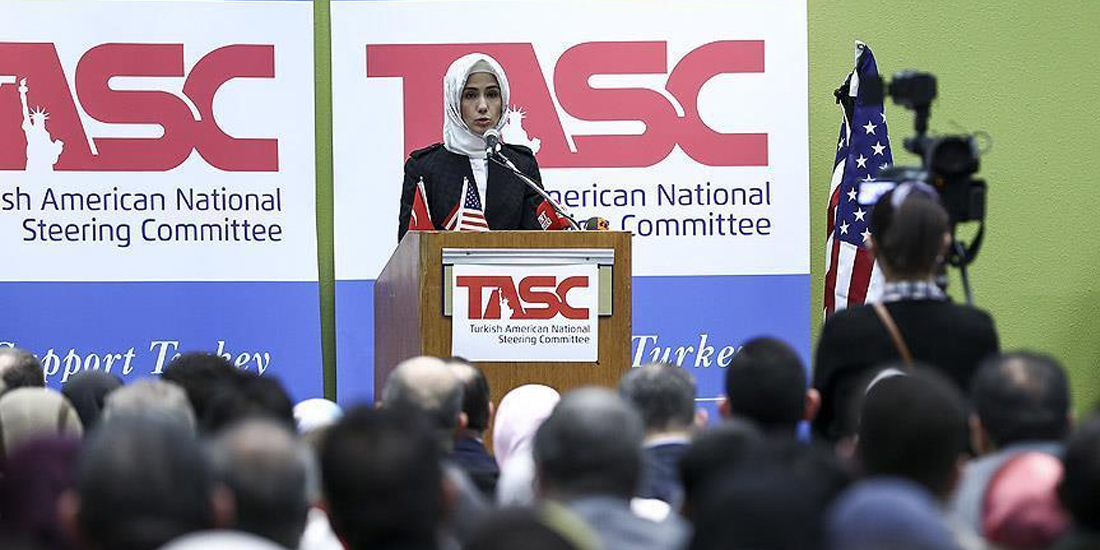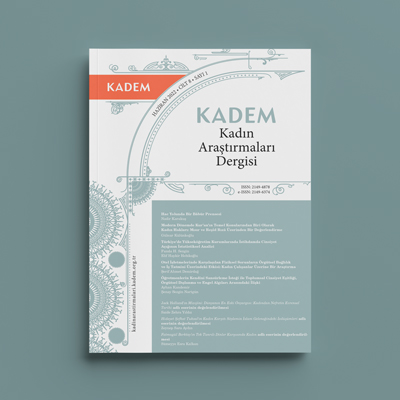KADEM Başkan Yardımcısı Sümeyye Erdoğan Bayraktar’ın 15. MAS-ICNA Kongresinde TASC tarafından düzenlenen “15 Temmuz ve Darbeye Direnen Kahramanlar” Toplantısında yaptığı konuşma metni:
As-salaam aleikum
Good afternoon,
Dear Ladies and Gentlemen, ambassador and consul general,
It is a great pleasure to join you in Chicago today. I would like to extend my gratitude to the Turkish-American National Steering Committee for organizing such a timely event. Before I begin, I would like to extend the greetings and regards of the Turkish people and in particular our President, Recep Tayyip Erdoğan to all friends of Turkey in the United States.
I went to college in the United States. During my stay here, I made very good friends, I enjoyed meeting people from different cultural bacgrounds, different religions and ethnicity. I had the chance to talk and discuss with these people on common issues and I would realize that it is more than necessary to build up grounds for different expressions to come together and listen to each other. This was exactly how I feel whenever I looked at the world across the ocean and, in particular, my native country, Turkey.
Now, looking at the world from Turkey today, I come to understand that we need new, better and diverse lenses to fully grasp new developments, conflicts and changes both in Turkey and in the Middle East. After all, the world is rapidly changing and we are going through a period in which the regional and global balance of power is being reconstructed and renegotiated. As such, it’s not enough to have a single perspective – instead, one needs multiple angles to understand this process.
I can speak for myself as a person working for an NGO, that the people of Turkey like to draw parallels between their country and a compass: While the straight leg symbolized our commitment to our values, culture and geography, the other signifies that we welcome the experiences of others and the world’s richness into our hearts and minds – which is only natural considering our nation’s history and neighborhood. Over the years, Turkey has been a country willing and able to engage in dialogue with various actors, while remaining true to its core principles, to promote regional and world peace. At the same time, the country has been a global player capable of devising independent policies – even when such steps come with a high price tag.
Dynamic and diverse, Turkey seeks to blend the experiences of the East and the West. We seek the universal without bowing to the shallowness of globalization.
I would like to take this opportunity to stress that Turkey is making an increasingly strong case to make history and tell its own challenge story. Especially since 2002, the country has taken major steps toward this goal by promoting closer cooperation between the government and the people. Even though we face global threats, Turkey’s transformation and renewal continues to attract the world’s attention.
Unfortunately, the Turkey’s improving self-confidence gave rise to certain challenges. Having been caught off-guard by the rapid transformation from a unipolar to a multipolar world order, proponents of the status quo have failed to widen their imagination and actively sought to derail Turkey’s efforts to write its own story.
Dear Friends,
As you already know, a failed coup attempt took place in Turkey on 15 July 2016. Alhamdolillah, this assault against our democracy was thwarted by peaceful civilian protestors, patriots within the Armed Forces who refused to join the coup plotters and selfless police officers around the country. In this sense, there is no doubt that July 15 marked a turning point in Turkey’s contemporary history.
Although Turkey witnessed military coups several times in the past, we were able to overcome those crises by using the tools of civilian politics. Each time democratically-elected governments were toppled by the military, we rebuilt our democratic institutions and carried on. The most recent coup attempt, in contrast, established beyond doubt that the Turkish people wouldn’t tolerate another assault. It became clear that there was no room for tanks rolling down our streets and Turkish taxpayers to be threatened with weapon for which they paid in the first place.
When the military perpetrated a coup thirty-six years ago, in 1980, a statement was issued on the state-run broadcaster TRT to inform the public that the Armed Forces had toppled the elected government and declared a curfew. At the time, there was no notable resistance to the generals. However, a lot has changed in Turkey since that time. Especially over the past 15 years, many Turks for the first time became agents of political change and openly challenged the military guardianship regime. On July 15, they proved that making an announcement on the public broadcaster and declaring a curfew had no effect on the population – except, perhaps, to remind them of the dark days that are now behind us.
This is a serious accomplishment for Turkish democracy. It is our collective success and a sign of how much Turkish democracy has matured over the years.
Unfortunately, elected representatives of the Western civilization, which produced a number of great works on the anti-democratic nature of military coups and the importance of a people’s free will, have failed to take a clear stand against the coup plotters in Turkey. I suppose it was their way of saying that the rules of democracy exclusively applied to themselves. Especially in Muslim countries, they tacitly maintained, assaults against democracy can be tolerated – and generals interfering in the political process, acceptable. By taking days and weeks to condemn the coup attempt, it is no secret that Western leaders are more interested in being able to work with the military junta than the electoral process as in the example of Egypt.
The West’s failure to fully grasp the failed coup, which millions of Turks from across the political spectrum consider a heinous attack on democracy, isn’t just sad. It’s also shocking.
Dear guests,
I would like to share some more information with you about what happened on July 15. The coup attempt, which was orchestrated by a group of Fetullah Gulen’s followers that infiltrated the Turkish Armed Forces, resulted in 248 casualties and left 2,194 people injured. During the attempt to overthrow the elected government, a number of public buildings including the Parliament and the Presidential Complex were bombed by hijacked F-16s. There was an assassination attempt against the President. Innocent civilians were ran over by tanks as they peacefully resisted the coup.
In the wake of the coup attempt, millions of people, including large numbers of women, without fear nor hesitation took to the streets with Turkish flags in their hands and stood in the way of tanks. Their peaceful resistance against an act of terrorism and the military guardianship regime went down in our history as a great moment. Meanwhile, brave young people climbed on tanks to teach the terrorists in uniform a lesson they will never forget. Having witnessed such heroism just months ago, many Turks can’t help but wonder: How can they even question the level of the Turkish people’s democratic consciousness?
For years, Western observers conveniently ignored our struggle for democracy and shamelessly described our peaceful resistance as fiction. It is important to note that the West’s double standards cause the Turkish people to lose faith in them.
The Turkish people’s courageous struggle for democracy deserves a place in the history of world democracies. On July 15, the guardianship regime couldn’t turn back the clock. Instead, the people, stepped up and made sure that our country would keep going forward.
There is ample evidence to establish that FETO, the terrorist group led by Fetullah Gulen, was behind the coup attempt. However, the group doesn’t just threaten Turkey: Over several decades, this criminal gang presented itself as an advocate of moderate Islam and organized in more than 160 countries under the pretext of helping the poor and providing educational opportunities to locals. However, FETO – whose leader lives in rural Pennsylvania—is actually a radical group like Daesh and Boko Haram. Unless necessary steps are taken to stop their growth without delay, they will pose a serious threat against Muslims around the world.
FETO and its sponsors have suffered a major defeat in Turkey on July 15. At the same time, the Turkish people –for the first time in their long history of military coups—thwarted an effort by the military to overthrow their democratically elected government. Having watched a wildly popular prime minister being hung by the junta in 1961, our nation wrote history on that fateful night. Needless to say, the citizenship consciousness and political subjectivity that we have developed over the past 14 years had a profound effect on the people’s response to the coup attempt.
Dear Friends,
Especially in recent years, the West’s antagonism toward Turkey has reached the level of clinical obsession.
As a social scientist and activist, I find the West’s approach toward Turkey extremely problematic. First and foremost, the behavior of Western observers reflects their failure to accurately understand how the world is changing. Unfortunately, they not only fail to grasp the nature of Turkey’s transformation but also cannot ask the right questions about the emerging balance of power in Europe, the United States and elsewhere. The Western intelligentsia’s futile effort to make sense of the world with reference to 20th-century cliches paves the way to new political and social crises.
European leaders, for instance, cannot seem to understand that their continent’s security depends on Turkey’s stability. In recent years, they not only refused to assist Turkey’s counter-terrorism efforts but also actively supported terrorist groups. At a time when PKK militants in Turkey perpetrated suicide attacks and killed innocent people, the group’s members continued to freely operate, recruit and raise money across the continent. What European policy makers do not understand, however, is that the PKK enjoys virtually no support among Turkey’s Kurdish community – mainly due to a series of democratic reforms implemented by the Turkish government since 2002. Furthermore, the predominantly Kurdish parts of Turkey continue to receive an equal share from public investments as the Western provinces.
Today, Turkey finds itself under fire from a number of terrorist groups including Daesh, PKK, FETO and DHKP-C. However, the people and their government work closely to raise awareness about what the terrorists wish to accomplish and respond to the threat of terrorism with unity and solidarity. Hopefully, our Western friends will look more closely and see the spirit of national unity, which transcends the traditional limits of ethnic nationalism, that has emerged in Turkey.
Honored Guests,
Turkey isn’t just a piece of land but a nation comprised of honest, hard-working people that honor their flag and gracefully mourn our men and women in uniform who lost their lives for their country. At the same time, our country represents hope for millions of disadvantaged people around the world. In the wake of the Syrian civil war, which claimed more than 600,000 lives since 2011 and compelled five million people to leave the country, the Turkish government’s policy has been guided by humanitarian concerns. In contrast, the international community turned a blind eye to the violent conflict, even though chemical weapons have been used against innocent civilians on multiple occasions.
Today, Turkey continues to bear the brunt of the humanitarian crisis next door. In addition to hosting close to three million refugees within our borders, we recently brokered a ceasefire agreement to evacuate 50,000 civilians from Eastern Aleppo. As we meet here today, hundreds of Turkish relief workers are stationed in Northern Syria to provide food, drinking water and shelter to the evacuees.
Ladies and Gentlemen,
To conclude, I urge our Western friends and colleagues to learn about Turkey from objective and accurate sources. Let us not forget that today’s Turkey is radically different from what the country was fifteen years ago. And on July 15, we overcame a serious challenge and further strengthened our democracy. It will take a fresh perspective to understand Turkey’s changing society.
We firmly believe that our nation’s righteous struggle will yield results soon and that the Turkish people will live peacefully once the threat of terrorism is neutralized. Turkey’s growing economy and vast human capital gives us a head start in the race to become one of the most important countries of the twenty-first century.
It has been a great pleasure to join you in Chicago today. I would like to take this opportunity to invite you to Turkey, the cradle of civilization and a stage for great transformations, to learn more about our country and draw your own conclusions.
Thank you.




